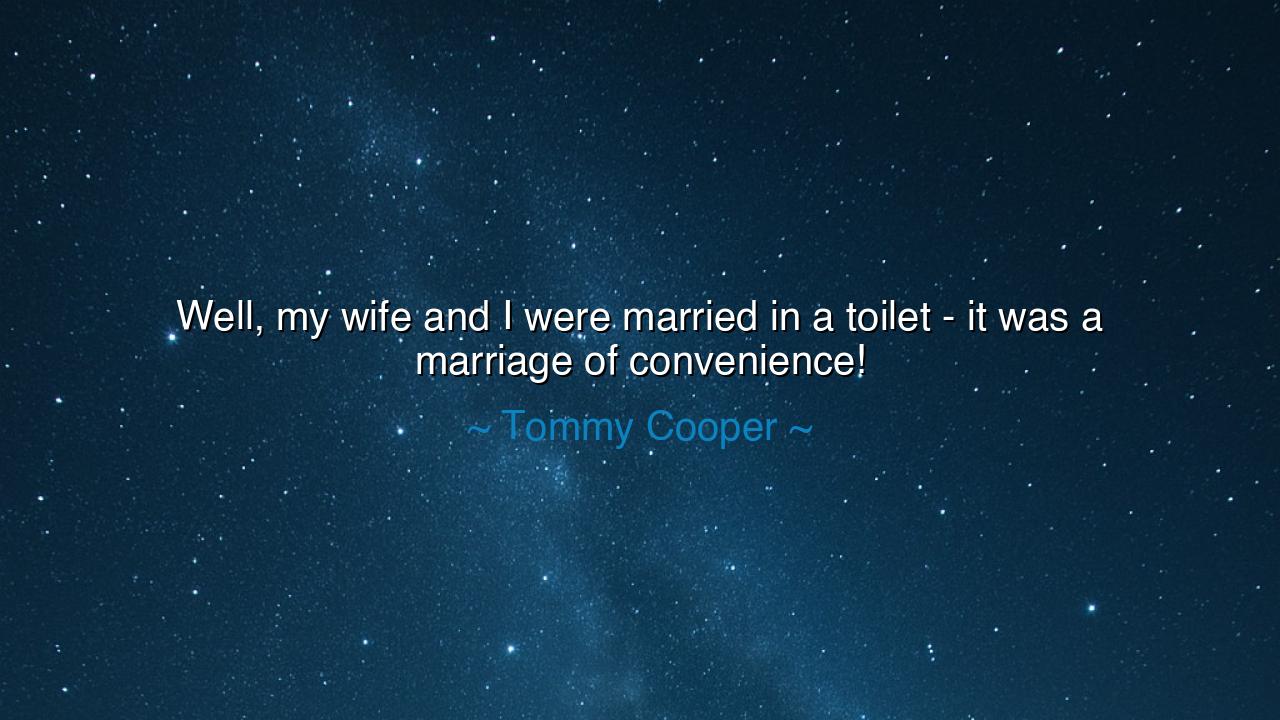
Well, my wife and I were married in a toilet - it was a marriage






In the humorous yet cunning words of Tommy Cooper, the great jester of the modern age, we hear this playful declaration: “Well, my wife and I were married in a toilet — it was a marriage of convenience!” At first, laughter bursts forth, for the surface of the joke gleams with absurdity. Yet beneath the laughter lies a reflection—of wit, of irony, and of wisdom born from jest. For the comedians of old, like the philosophers of Greece, cloaked truth in humor so that it might be more easily received. And in this jest of marriage, convenience, and life’s humble beginnings, there lies a lesson on love, imperfection, and the art of not taking oneself too seriously.
To understand the meaning of this quote, one must remember that Tommy Cooper was a master of contradictions—a magician who made failure his act, a fool who spoke truth through laughter. When he says he was “married in a toilet,” we know it is not a confession, but an exaggeration meant to deflate the pomp that so often surrounds human vanity. His phrase, “a marriage of convenience,” which in other contexts describes unions made for advantage rather than love, is here transformed into pure irony. The toilet, the humblest of human spaces, becomes a stage for mocking the grand seriousness with which people often speak of marriage and romance. Through jest, he reminds us that love need not be idealized; it need only be real—rooted in laughter, imperfection, and shared humanity.
The origin of this wit lies deep in the ancient tradition of comedy itself. For laughter has always been the wisdom of the soul clothed in folly. In the courts of kings, the fool was not the ignorant, but the wise—the only one free to speak truth without fear of punishment. So too, Cooper’s jest acts as a mirror held up to society. He mocks the concept of the perfect marriage—the glittering ceremonies, the solemn vows spoken without understanding, the illusions that crumble when faced with ordinary life. By saying he was “married in a toilet,” he brings marriage down from its pedestal to its true home: the place where two imperfect beings share the messy, daily realities of existence. It is not in the grand halls but in the small, unglamorous spaces that love is proven.
Consider the life of Abraham Lincoln and his wife, Mary Todd—a union often described as tempestuous and difficult. Their marriage was far from ideal, marked by sorrow, arguments, and loss. Yet through it all, there was endurance, affection, and shared purpose. In many ways, it was a “marriage of convenience” in the truest, most human sense—not of cold calculation, but of two flawed souls who, despite their struggles, found meaning in walking life’s uneven road together. Like Cooper’s jest, their story reveals that the foundation of love is not glamour or ease, but endurance, humor, and forgiveness.
There is also a spiritual wisdom hidden in Cooper’s joke. The toilet, though coarse, is a place of cleansing—a symbol of the humble, necessary work of maintaining life. Marriage, too, is such labor. It requires the daily effort of cleaning away resentment, pride, and misunderstanding. To be “married in a toilet” is to begin from humility, to recognize that life is not lived in grand ideals but in the ordinary—where laughter often becomes the highest form of grace. It is in laughter that forgiveness begins; it is in humor that the weight of expectation is lifted, and love is allowed to breathe.
In this way, Tommy Cooper’s humor becomes more than jest—it becomes philosophy. He shows us that to endure in marriage, one must learn to laugh at oneself and one’s partner; to find joy not only in triumphs but also in the absurd, the inconvenient, the imperfect. The marriage of convenience, when seen through Cooper’s lens, is not cynical but realistic—it is the understanding that companionship, built upon mutual laughter and acceptance, is itself a form of salvation.
The lesson, then, is this: do not seek perfection in love, for perfection is the death of joy. Seek instead humility, humor, and gratitude. Learn to laugh, especially when the world seems foolish. When you quarrel, when pride rises, when life becomes inconvenient—remember that laughter is the bridge back to peace. For as the ancients taught, the gods favor not those who are flawless, but those who can laugh at their own humanity.
Therefore, let us take Tommy Cooper’s jest as more than comedy—it is a parable. Let us remember that life’s most sacred unions are not those sealed in splendor, but those tested and renewed in laughter. Marriage, whether born of passion or convenience, flourishes when it is seasoned with joy and humility. And if we must begin, like Cooper, “in a toilet,” then let us not despair—for even the humblest place may become holy, when filled with love and laughter. For laughter, my friends, is the true magic that transforms the ordinary into the divine.






AAdministratorAdministrator
Welcome, honored guests. Please leave a comment, we will respond soon